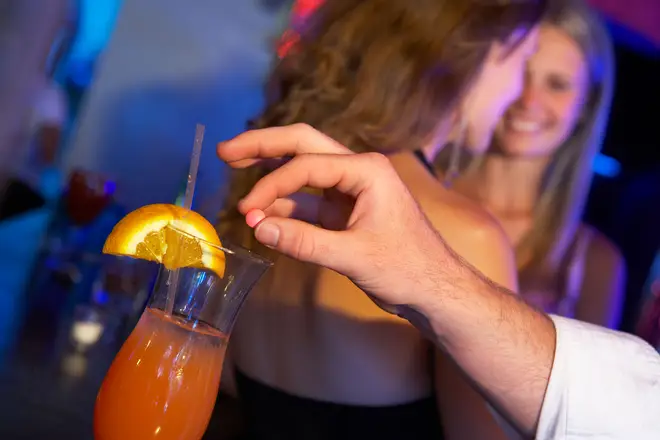
Paul Brand 10am - 12pm
18 December 2023, 14:13 | Updated: 18 December 2023, 14:23

The government has announced new measures to crackdown on spiking, including funding for testing kits and training door staff - but Labour says "there is more work to do."
With spiking cases having risen by 400 per cent in the last five years, the government has announced a number of measures as part of a package to tackle the epidemic.
The increase represents just under 5,000 cases of reported needle and drink spiking incidents in England and Wales in 12 months from September 2022, according to the National Police Chiefs’ Council (NPCC)
Spiking is when someone puts drugs into another person’s drinks, or directly into their body, without their consent or knowledge.
Read more: 'It isn't good enough': Spiking Inquiry reveals victim-blaming and lack of victim support
Read more: Alex Batty's mother 'thought Covid-19 was created by the state,' friend says as Interpol joins search
Ministers have faced pressure to make spiking via needle and drink a specific offence, but the measures announced today stop short of making spiking one.
Instead, the government has set out practical steps it is taking to protect women during the festive party going season.
The measures come alongside plans to modernise the law to make it clear that spiking is a crime.
Colin Mackie, who set up Spike Aware after losing his son to drink spiking, told LBC that the measures are a "step in the right direction."
However, he is disappointed that the measures do not make spiking a "specific offence."

Mr Mackie continued: "We really need a stand-a-lone offence" to encourage "more people to report it [spiking]."
He also vocalised his disappointment about the measures not covering unlicensed premises, even though "a lot of spiking" cases occur there.
With plans to amend the Criminal Justice Bill and updates to the Offences Against The Person Act 1861, officials also added that hundreds more door staff will be trained to combat potential perpetrators and signs of spiking.
People shouldn't live in fear of being spiked. This festive season or any other time.
— Home Office (@ukhomeoffice) December 18, 2023
We're amending the law to keep you safe. pic.twitter.com/LUcMSTKcQA
The government has added that it will invest in research into test kits, whilst the National Police Chiefs Council (NPCC) will run "intensive operations" on key weeks across forces in England and Wales.
Home Secretary James Cleverly said: "Tackling violence against women and girls is a personal priority for me and this Government has shown time and again that we will do what is necessary to keep the public safe.
"Spiking is a perverse crime which can have a lasting impact on victims. Our comprehensive new measures are designed to help police and staff in bars, restaurants, pubs and other premises to protect victims and bring more offenders to justice."
An online tool will also be published to all police forces to make anonymous reporting of suspected speaking easier, with new guidance for the public to also be published.
Following a consultation, the government said it will also support the Office for Students to actively prevent sexual misconduct in universities and colleges.
It has also already been confirmed by the Home Office that there are plans for a separate statutory guidance that will provide a "clear" and "unequivocal" definition of spiking.
The guidance is expected to take the form of an update, issued under Section 182 of the Licensing Act 2003

LBC Reporter Charlotte Lynch speaks to Shelagh Fogarty about needle spiking
Whilst Labour has said the Conservatives are "moving in the right direction", the opposition party said "there is more work to do."
Alex Davies-Jones, Labour’s shadow minister for domestic violence and safeguarding, said: "The Conservatives are finally moving in the right direction but there is more work to do when, as figures from earlier this year showed, spiking reports had risen fivefold but the proportion leading to charges fell.
"Labour has called for spiking to be made a separate offence to increase people coming forward and the chance for convictions, and for every police force to have a rape and serious sexual offence unit."
According to the Metropolitan Police, spiking symptoms could include:
The symptoms usually start 15 minutes after being spiked and can last several hours.
Spotting symptoms may be difficult as they can be similar to drinking too much.
Victims of spiking may also experience these emotions:
Victims could also be in a state of denial and may:
These feelings may be felt more intensely if victims have an existing mental health condition.
It is advised victims let police know about mental health problems so you can discuss support options.
If you have been spiked and need emergency medical support, let the medical staff know about your mental health problems.